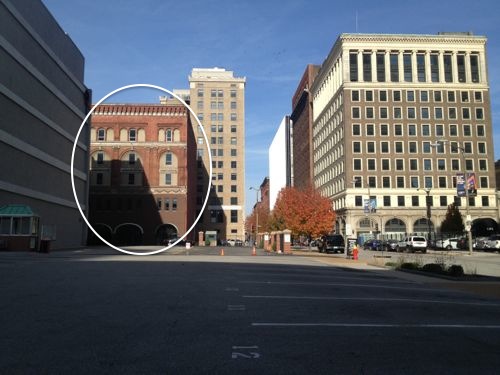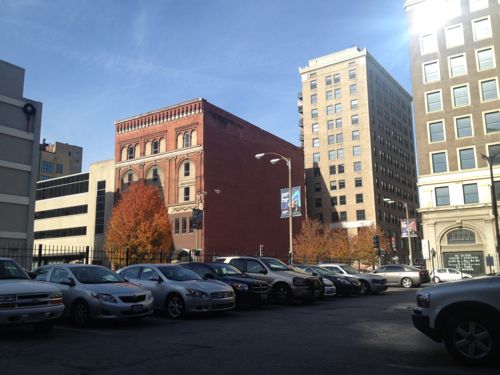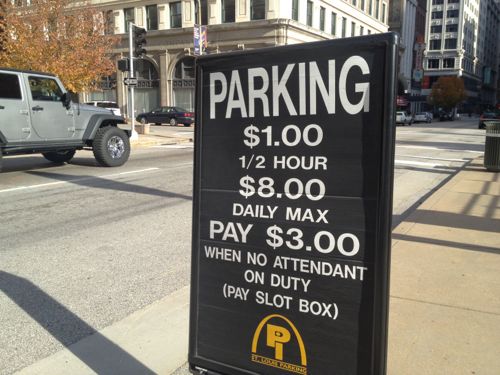St. Louis Needs A Moratorium On Surface Parking Lots
Downtown has an excess of parking spaces: in garages, surface lots, and on the street, parking downtown is no problem at all. Yet some building owners seem to think each building needs it’s own dedicated parking. This is what’s done in suburbia, each building placed in the center of the property.



On Monday the Preservation Board will consider a request by the owner to raze the building at 1105-09 Olive Street for parking. The 4pm meeting is held at 1520 Market St #2000. I emailed my objections to the Director of Cultural Resources Betsy Bruce, 7th Ward Alderwoman Phyllis Young, and Partnership for Downtown St. Louis President Maggie Campbell days ago.
Additional reading:
We need an immediate moratorium on surface parking to protect downtown’s future. Nobody ever planned a convention or family vacation based on the amount of cheap surface parking. That’s also not a factor in deciding to live downtown. Companies that’ve relocated from the suburbs to downtown have done so because of the vibe, the places to walk to.
— Steve Patterson
UPDATE: 11/27/2012 8:30am: I saw postings on social media last night that the Preservation Board denied the preliminary request for demolition. We still need to pressure leaders to get a moratorium.
One, I agree, completely, with your basic conclusions – we don’t need any more surface parking downtown, and a moratorium would likely be a good, workable short-term solution. Two, I disagree with a couple of your assumptions / “reasons why”. The first is your assumption that it’s the cost of daily or hourly parking (your last photo). It’s not, it’s the price and the availability of monthly parking, for CEO’s and employees. The other is your assumption that an outright prohibition is the best answer, when the reality is changing the economic paradigm is a much better and more sustainable answer.
My last point first – surface parking is far from the highest and best use of any parcel, barely a step up from a junk yard or a vacant lot. But the reason it happens, and apparently continues to happen downtown, is simple economics – it costs less to buy a building (at an absurdly low, below-replacement cost), knock it down (even with the costs for asbestos and lead abatement) and pave the lot than it costs to buy an existing vacant or surface parking lot (every commercial property is for sale for the “right” price) and to construct a parking structure. Rents for office and retail space have to go up, significantly, downtown (and that will only occur with increased demand) before this dynamic will ever change. Do the math. Even at $5 a day, times 20 days a month, that’s $100 a month and $1,200 a year for a 300 square foot spot, or $4 a square foot in gross revenue ($8 a day kicks it up to $6.40 per square foot). Compare that with the (likely) $12-$15 a square foot the existing structure might generate in gross revenue (and it’s $0 when it’s vacant), combined the much-higher costs of maintaining a multi-story structure (repairs, renovations, utilities, taxes, security, depreciation, responding to tenant complaints, etc, etc.) and the “why” starts to make some sense in this case.
The other issue is more about intangibles and competition. The reality is that having dedicated employee parking available (or viable transit options) IS a big issue in locating most businesses (been there, done that). If two similar buildings, within blocks of each other, offering similar amenities and similar rents, are competing for a tenant, and one has dedicated, “free” or affordable parking available and one doesn’t / has much less / costs much more / is further from good transit options (Metrolink station), then one has a significant competitive advantage / disadvantage over the other. It still boils down to money. It may not be fair, right, urban or the right thing to be doing, but it’s how landlords compete for tenants and how tenants make decisions. You and younger employees may embrace the concept of walking multiple blocks every day, but most older, senior management members (the deciders) are more interested in managing tight schedules and not breaking a sweat getting to work every day or to meetings with clients. This can and should happen downtown, but it boils down to keeping the CEO’s happy . . . .
You proved my point. Monthly rates are cheaper than the daily rates so existing spaces can be leased on a monthly basis without needing to acquire a building, raze it and pave the land. Not buying a nearby building for parking increases the activity level in the area once renovated, increasing demand on your own property. More people also means more goods & services for employees during lunch and after work. Transit will improve too as more people concentrate in an area, such as the modern streetcar line now being studied.
However, if the parking lot owner can make more money every month by charging hourly or daily rates than they can by having monthly contracts, which one do you think they’ll choose? It all boils down to the three basics in real estate, location, location and location. If the building owner can’t secure a long-term commitment from any nearby parking lots (a real possibility), the hassles of tearing down a “perfectly good building”, to create parking that (s)he can control, starts to make more sense (to them and their tenants). Probably what really needs to happen (until our local economy improves) is figuring out how to make parking work in vacant shells: http://weburbanist.com/2011/01/01/detroits-michigan-theater-the-worlds-most-beautiful-parking-lot/
Much agreed. Our city can’t pave her way to being world class again.
I live near one of these surface lots mentioned above. Another issue about these lots is the lighting that lights up my loft at night like a search light. It takes away from the skyline at night because of the glare. Surely this must be some violation of city ordinance. These lights are such a nuisance to the surrounding dwellings. I live on the 8th floor of my building and these lights glare in. I understand the need for safety but why the light has to shine up to the eighth floor of a building is ridiculous. This parking company is obviously too cheap to put deflectors on these lights.
is a light this bright really necessary?
Given our perceived crime levels, probably yes . . . . However, here is the relevant Zoning requirement that you can use to get some relief (see the last sentence):
“26.16.080 Off-street parking and loading requirements.
C. 1. Off-street parking or off-street loading areas in any dwelling
district shall not extend beyond the building line or into the front yard
area. When provided in non-dwelling districts, it may occupy any open land,
including front yards, but no parking structure shall extend beyond the
building line in any district. The parking space provided shall be paved
with bituminous concrete or equivalent surfacing, clearly marked, and
contain adequate entrances and exits, and shall be kept free from dust and
be used only for parking. When lighted for nighttime use, no light shall be
permitted to cast its light upon any dwelling nearby.”
You’ll need to start with either Zoning (http://stlouis-mo.gov/government/departments/public-safety/building/zoning.cfm ) or the Citizens Service Bureau (http://stlouis-mo.gov/government/departments/public-safety/neighborhood-stabilization-office/citizens-service-bureau/ ). And because this is St. Louis, you can always also include your alderman!
Thank you so much JZ71 for this information. I am going to take action in the steps you outlined. I, and other tenants in my building, have been annoyed by this light. I have a magnificent view from my south windows of the skyline at night from Wash Ave, but for the last year or so, this parking lot light is so bright, you can’t enjoy it and i have to pull my blinds at night because it literally casts shadows on my interior north wall of my loft. Again, I understand the need for safety but illuminating anything more that the ground below is a nuisance to those living above ground floor. And 8 floors up is a bit much. thank you again
I agree with Steve surface parking lots should be banned in downtown. It is absurd that citizens even have to even mention this. The city is such a damn mess with many transit, walkability architectural and urban planning failures yet City government continues to make it worse by allowing these sorts of demolitions.
The city apparently doesn’t know what to do with this street and intersection. There are no ideas on how to create vibrant streets and vital districts. Instead there seems to be this random, anything goes attitude.
It is impossible to develop a walking city and a workable transit system under current policies. Yes, so a ban on surface parking should be instituted immediately to allow development of different approaches to the sixty years of decline current policies have brought on.
“The city” can only do so much. Yes, they (“we”) can say “No!” No, they (we, the taxpayers) can’t (afford to) build something on every corner, at public expense, and they (“the city” / we, the taxpayers) sure can’t force any property owner to build something, anything, if the property owner a) doesn’t have the money to do so or b) doesn’t want to build something at this time. All “we” (as a city) can do is to guide development and construction when it actually happens!
With downtown parcels, and property anywhere else, a property owner has six options:
1. Keep the existing structure(s) in place, assuming it’s in decent shape and it has a viable use(s).
2. Enlarge the existing structure(s), to accommodate more or growing viable uses.
3. Demolish all or part of the existing structure(s), IF there are no viable uses, the costs of maintenance become untenable and/or it’s truly unsafe.
4. Build a new and better structure(s), immediately. (see BPV, for one extreme, or how a McDonalds or a gas station/mini-mart is knocked down and rebuilt within a couple of months, for the other extreme)
5. Leave the land vacant, hopefully with the weeds cut, the trash picked up and the sidewalks maintained.
6. Create an interim use (such as surface parking), to both help pay the carrying costs on that parcel and to help adjacent properties remain viable.
Urban areas continue to evolve or they die, slow, painful deaths – see East St. Louis – they’ve moved beyond surface parking lots to a return to the prairie. Surface parking should never be viewed as the final answer, but it is both a good placeholder and, in a perverse way, an indicator of a downtown’s health and viability. If surface parking lots are packed and prices are high and rising, it means demand is high, and higher and better uses will be coming. If they’re half empty (or worse) and prices are low and falling, it means demand is low, as well. And, in reality, there isn’t much difference between an empty surface parking lot and a weedy vacant lot!
When I moved to Denver in the 1970’s, there were many blocks in downtown of surface parking lots, many a result of urban renewal efforts. In the last 40 years, many of these lots have been replaced by new, dense, urban structures. As best as I can tell, not nearly as much has happened here. It has little to do with “regulations”, it has a whole lot to do with companies and their employees wanting to be here, there or somewhere else. It also has a lot to do with how public transit is viewed and embraced in a region. For whatever reason, here, Metro, especially on the bus side, is viewed as something only the poor use. In Denver, their RTD is much more successful in attracting choice riders, middle class commuters who either don’t want to pay to park or to deal with rush hour congestion. If we want surface parking to go away here, we need to create a lot more demand for both buildings and transit!
And how do we create more demand for both buildings and transit? Not by tearing down more buildings and making streets less walkable with parking lots. St. Louis has followed auto only city planning for 60 years, it has nearly destroyed the city. It is time to try new approaches. If Larry Deutsch knew that he didn’t have a snow ball chance in hell of tearing down the building Craig Heller would have bought it and rehabbed it. (see Vanishing St. Louis)
Unless Deutsch is buying off people in the City the logical efforts should be to find ways to use current parking lots more efficiently, even to the extent of using eminent domain to take over lots for that purpose.
It is in the public interest to have a robust transit system and a walkable and high quality city. That far outweighs the interests of Mr. Deutsch who is only thinking of himself.
The 60 year decline of St. Louis is a result of allowing the Deutschs of the world to walk all over city officials and their urban building obligations instead of representing the interests of the citizens.
This is not to mention Global Warming and oil shortages as the backdrop to rethinking how we build our cities.
I guess the Democrats in St. Louis City Hall are Global Warming deniers too. Certainly urban planning policies, or the lack of planning continues the same auto only policies to the determent of city growth and investment.
Every time I turn around, there is another parking lot or structure going up. These existing lots around where this proposed location are not even full. Yet, another? I heard the party that owns this building sued (rather unsuccessfully) the Louderman Lofts claiming the construction of that building compromised the foundation and it was unsafe. Sounds like they are trying another money grab. I hope this request is denied. We do not need to loose another building downtown for parking. Enough is enough. Thank you for posting this – I was unaware.
Was in St. Louis over the weekend to visit family and ate down town at Rooster. It was sad how many buildings were missing and converted to surface parking. A smile isn’t so appealing with missing teeth. I guess the amount of surface parking is a result of the lack of demand for downtown office space. There are still several very large buildings and some whole blocks that are full of empty buildings. Contrary to what many say, I say it’s better to let the buildings sit empty than to tear them down for surface parking.
Disgusting. An embarassment if demolition pushes forward.
The city needs to get some self respect and learn to say “no”.
I was at the Preservation Board meeting last night and I think this prelim request was the longest in board history (1.5 hours long). While is is shame to tear down an existing structure for a parking lot, the building is in dire need of foundation repair. When a construction co. built the parking garage next door, they cut away some of footings which caused damage to the structure of the building in question. In fact, the owner (who has not paid any taxes on that building for 6-7 years) sued the construction company and won a $1.2 Million lawsuit. He took off with the money (and his restaurant) to a different location and sold the building for $160,000 (and of course all the back taxes). So the new owner wants to tear down the building citing it is structurally unsafe and build a parking lot for the future tenants of his new loft project (Laclede Gas Building Lofts). I don’t know if the structure itself is historically significant, but it is better than another parking lot. On the other hand, there were architects there last night who testified that the building was not sound in structure so who will pay for the repairs and who will then occupy the building? If the building is to remain, there needs to be someone to buy it, correct the current problems (an estimated $1.2 million worth), and then get tenants in there or resell the place to at least match their investment. I hope there are people smarter than I to figure this out.
Thanks Dan for letting us know what transpired in the meeting. The former owner of this building should be ridden out of town on a rail. This deadbeat not only clogged many artieries with that greasy horrible pizza and chicken wings, but he allowed people into do this in a structurally unsafe building. And then has the gall to reopen just blocks away, with what I am assuming is still the same garbage he was dishing out on Olive & 11th. He must know some people in high places to be able to get away with this. Another reason, I am against this demolition is if you been in that restaurant and how filthy it was, I can only imagine the number of cockroaches left behind. They will be displaced upon demolition and invade surrounding businesses and residences.